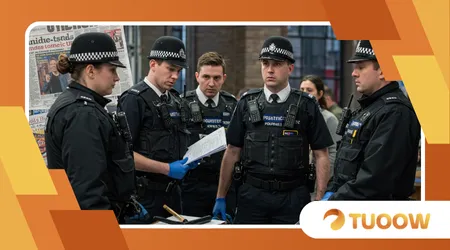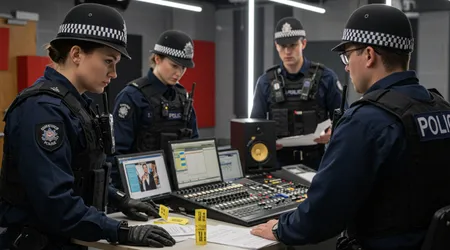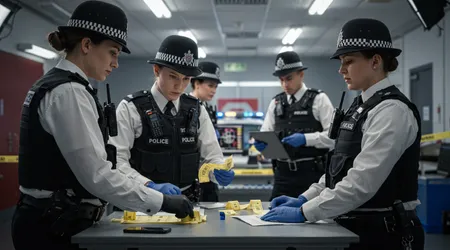UK Counter-Terror Police Probe Kneecap Band Over Hamas and Tory Remarks

UK Counter-Terror Police Probe Kneecap Band Over Hamas remarks has ignited a firestorm, thrusting the Belfast rap trio Kneecap into a contentious spotlight.
Their provocative performances, blending Irish republicanism with sharp political commentary, have long courted controversy.
Now, two videos one from 2023 allegedly inciting violence against Tory MPs, and another from 2024 chanting support for Hamas and Hezbollah have drawn the scrutiny of the Metropolitan Police’s Counter Terrorism Internet Referral Unit (CTIRU).
The band, comprising Mo Chara, Moglai Bap, and DJ Próvaí, dismisses the investigation as a “coordinated smear campaign” targeting their outspoken criticism of British and Israeli policies.
This saga raises thorny questions: where does artistic expression end, and where does incitement begin?
As the debate unfolds, we delve into the band’s actions, the legal stakes, and the broader cultural implications.
The controversy isn’t just about lyrics or stage antics it’s a collision of free speech, political dissent, and national security.
Kneecap’s defenders argue their art reflects raw frustration with historical and ongoing injustices, while critics, including Conservative leader Kemi Badenoch, condemn their rhetoric as dangerous glorification of terrorism.
With the UK Counter-Terror Police Probe Kneecap Band Over Hamas chants now dominating headlines, this article unpacks the nuances, exploring the band’s history, the legal framework, and the polarized reactions.
Let’s navigate this complex terrain with clarity and insight.
Kneecap’s Provocative Legacy: Art as Rebellion
Kneecap has never shied from controversy, wielding music as a weapon of dissent.
Their Irish-language rap, rooted in Belfast’s republican heartlands, channels anger over British rule and global issues like Palestine.
In 2023, at London’s Electric Ballroom, a band member allegedly declared, “The only good Tory is a dead Tory. Kill your local MP.”
The crowd roared, but the remarks, resurfacing in 2025, sparked outrage.
Fast-forward to November 2024 at the O2 Forum Kentish Town, where Mo Chara, draped in a Hezbollah flag, reportedly shouted, “Up Hamas, up Hezbollah.”
These moments, now under the UK Counter-Terror Police Probe Kneecap Band Over Hamas lens, epitomize the band’s confrontational style.
Their supporters see this as art reflecting lived experience an unfiltered cry against oppression.
Kneecap’s 2025 Coachella performance, projecting “F*** Israel, Free Palestine,” further amplified their global reach. Yet, their detractors argue this crosses into incitement.
The 2023 video, for instance, alarmed MPs like Greg Smith, who called it “sickening” given the murders of MPs Jo Cox and David Amess.
The band’s defenders counter that such rhetoric is hyperbolic, not literal, akin to punk’s anarchic provocations of the 1970s.
++ New TV Drama Revisits Jean Charles de Menezes Case After 7/7 Attacks
This isn’t Kneecap’s first brush with authority. In 2023, they won a legal battle against the Tory government, which had blocked a £14,250 arts grant over their anti-British stance.
Labour’s decision not to contest the challenge allowed the funds to flow, fueling accusations of leniency.
Now, with the UK Counter-Terror Police Probe Kneecap Band Over Hamas remarks, the band’s history of pushing boundaries faces its sternest test.
Are they fearless artists or reckless provocateurs? The answer hinges on context and intent.

Legal Stakes: When Words Become Crimes
The UK Counter-Terror Police Probe Kneecap Band Over Hamas chants rests on serious legal grounds.
Under the Terrorism Act 2000, expressing support for proscribed groups like Hamas and Hezbollah is a criminal offense, punishable by up to seven years in prison.
The 2024 video, showing a band member draped in a Hezbollah flag, has been referred to the CTIRU for assessment.
Also read: The Best Areas to Buy Property in the UK in 2025
Similarly, the 2023 footage, with its alleged call to “kill your local MP,” raises concerns of incitement to violence, another prosecutable offense.
The Metropolitan Police confirmed on April 22, 2025, that both clips are under review to determine if further investigation is warranted.
| Incident | Date | Alleged Remarks | Legal Issue |
|---|---|---|---|
| Electric Ballroom Gig | November 2023 | “The only good Tory is a dead Tory. Kill your local MP.” | Incitement to violence |
| O2 Forum Kentish Town Gig | November 2024 | “Up Hamas, up Hezbollah” with Hezbollah flag | Support for proscribed groups |
The legal threshold is high. Prosecutors must prove intent to incite or tangible support for terrorism, not just provocative speech.
For example, in 2019, a UK man was convicted for displaying a Hezbollah flag at a rally, deemed as glorifying terrorism.
Kneecap’s case, however, is murkier stage performances blur the line between art and advocacy.
Their solicitor has called the probe “ludicrous,” arguing it misreads performative exaggeration as genuine intent.
Yet, with the UK Counter-Terror Police Probe Kneecap Band Over Hamas remarks, the risk of prosecution looms large.
Context matters immensely. The 2024 gig occurred amid heightened Israel-Palestine tensions, post-October 7, 2023, when Hamas’s attack killed 1,200 Israelis.
Kneecap’s Coachella set, projecting anti-Israel messages, drew ire from groups like UK Lawyers for Israel, who flagged their “anti-Israel hatred.”
The 2023 remarks, meanwhile, tap into Irish republican grievances but shock in a UK scarred by political violence.
The law must balance free expression with public safety a tightrope walk in this polarized climate.
Political Reactions: A Divided Spectrum
Outrage over Kneecap’s remarks spans the political divide, but responses vary sharply.
Conservative leader Kemi Badenoch has demanded prosecution, branding the band’s rhetoric as “glorification of terrorism.”
She cited the 2024 video, arguing it fuels “anti-British hatred.” Downing Street echoed this, condemning the 2023 remarks as a “chilling” threat to democracy.
The UK Counter-Terror Police Probe Kneecap Band Over Hamas chants has thus become a political lightning rod, with Tories leveraging it to critique Labour’s arts funding decisions.
Labour faces a dilemma. Culture Secretary Lisa Nandy, who oversees the Music Export Growth Scheme that funded Kneecap, announced a review of the program in April 2025.
Critics like shadow Justice Secretary Robert Jenrick accuse Labour of “two-tiered policing,” noting the lack of swift action against the band.
Yet, Labour’s base includes vocal supporters of Palestine, complicating their stance.
Taoiseach Micheál Martin, speaking from Dublin, urged Kneecap to clarify their views, reflecting cross-border unease.
Public sentiment, gauged via X posts, is equally split. Some users, like @JerusalemDiary, amplify the terror probe narrative, while others, like @eyuplovely, allege a “Zionist” smear campaign.
A 2025 YouGov poll found 62% of UK adults believe musicians should face legal consequences for inciting violence, underscoring public concern.
The UK Counter-Terror Police Probe Kneecap Band Over Hamas remarks thus mirrors broader societal fault lines free speech versus security, art versus accountability.
Cultural Implications: Art in the Crosshairs
Kneecap’s saga transcends legal and political realms, touching the heart of cultural expression.
Their music, laced with Gaelic pride and anti-establishment fervor, resonates with youth alienated by power structures.
The 2024 video, with its Hezbollah flag, echoes the punk ethos of shocking to provoke thought. But in a post-9/11 world, such gestures risk being read as endorsements of violence.
The UK Counter-Terror Police Probe Kneecap Band Over Hamas chants thus tests the limits of artistic freedom.
Consider the analogy of a tightrope walker: Kneecap balances between bold expression and legal peril, with the crowd fans, critics, and police watching every step.
Misjudge the wind, and they fall. Historically, artists like The Sex Pistols faced censorship for less, yet their legacy endured.
Kneecap’s defenders argue they’re scapegoats for a state uneasy with dissent, pointing to their Coachella backlash as evidence of targeted outrage.
Critics, however, see a reckless flirtation with extremism.
The global stage amplifies this tension. At Coachella, Kneecap’s anti-Israel messages reached millions, prompting Sharon Osbourne to call for their US visa revocation.
This international fallout underscores the stakes: in a connected world, local provocations ripple far.
The UK Counter-Terror Police Probe Kneecap Band Over Hamas remarks could chill other artists, signaling that bold political art invites scrutiny.
Will this stifle creativity or sharpen its edge? The question lingers.
The Smear Campaign Claim: Truth or Deflection?

Kneecap’s assertion of a “coordinated smear campaign” merits scrutiny.
On April 25, 2025, they posted on X, claiming their critics, including the Community Security Trust, exaggerate their actions to silence pro-Palestine voices.
The timing post-Coachella, with resurfaced videos lends credence to their narrative. Yet, the Hezbollah flag and explicit Tory remarks aren’t easily dismissed as artistic flourish.
The UK Counter-Terror Police Probe Kneecap Band Over Hamas chants demands they clarify intent, not dodge accountability.
Supporters point to precedent: in 2018, rapper Stormzy faced backlash for anti-Tory lyrics, yet escaped legal woes. Kneecap’s case, however, involves proscribed groups, raising the stakes.
Critics like UKLFI argue the band’s Coachella antics “whipped up anti-Israel hatred,” citing the October 7, 2023, Hamas attack’s emotional weight.
The band’s refusal to retract their statements, instead doubling down on social media, fuels perceptions of defiance over dialogue.
Imagine a playwright whose satire is mistaken for a manifesto Kneecap’s predicament mirrors this.
Their solicitor’s dismissal of the probe as “ludicrous” suggests confidence, but public opinion sways against them.
A single statistic chills: 1,200 Israelis died on October 7, 2023, a fact invoked by critics to frame Kneecap’s Hamas chants as callous.
The UK Counter-Terror Police Probe Kneecap Band Over Hamas remarks thus tests whether the band can navigate this storm without self-destruction.
Looking Ahead: Art, Law, and Society
What does the future hold for Kneecap and the broader artistic landscape?
The UK Counter-Terror Police Probe Kneecap Band Over Hamas remarks could set a precedent, redefining how courts interpret performative speech.
If prosecuted, the band faces fines or jail, potentially martyring them among fans. If cleared, critics may cry foul, alleging selective enforcement.
Either way, the saga underscores a truth: words wield power, and artists bear responsibility for their echo.
The probe’s outcome hinges on evidence and intent. The CTIRU’s assessment, expected by mid-2025, will clarify if the videos breach terror laws.
Meanwhile, Kneecap’s scheduled Glastonbury performance in June 2025 looms as a flashpoint. Will they tone down or double down?
Their past suggests the latter, but legal pressures may force restraint. Society, too, must grapple with balancing dissent and safety in an era of polarized discourse.
Ultimately, this isn’t just about Kneecap it’s about us. How do we define freedom in a world scarred by violence?
The UK Counter-Terror Police Probe Kneecap Band Over Hamas remarks challenges us to reflect, not react.
As the band navigates this crucible, their story reminds us: art can ignite change, but it can also burn. Let’s hope clarity, not chaos, prevails.
Frequently Asked Questions
Q: Why is Kneecap under investigation?
A: The UK Counter-Terror Police Probe Kneecap Band Over Hamas remarks stems from two videos: one (2023) allegedly inciting violence against Tory MPs, and another (2024) chanting support for Hamas and Hezbollah, both proscribed groups.
Q: Could Kneecap face jail time?
A: Yes, under the Terrorism Act 2000, supporting proscribed groups or inciting violence carries up to seven years’ imprisonment, though prosecution requires clear evidence of intent.
Q: Is this a smear campaign against Kneecap?
A: Kneecap claims a “coordinated smear campaign,” citing the timing of resurfaced videos post-Coachella. Critics argue their explicit remarks justify scrutiny, not orchestration.
Q: How does this affect artistic freedom?
A: The probe raises concerns about chilling artistic expression, as performers may self-censor to avoid legal risks, but it also underscores accountability for inflammatory rhetoric.
